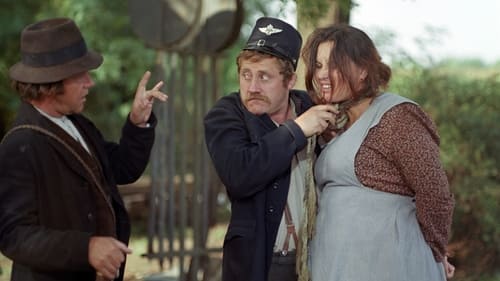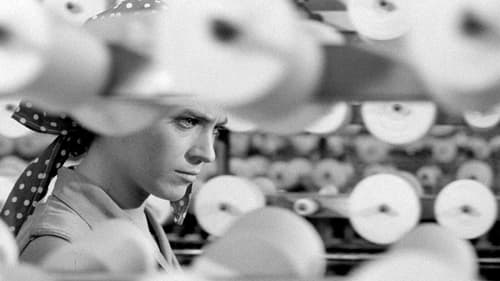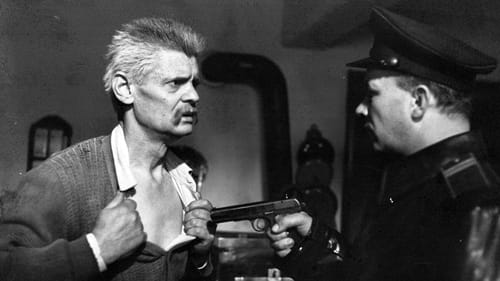Teri Horváth
Birth : 1929-08-18, Rábatamási, Hungary
Death : 2009-03-06

A Banya
The story of Bendegúz, the teenage boy who never succeeds in anything and about whom everybody's first though is "I wish you had been hanged when you were born!" drops out of school and becomes a cowboy. He works for the Stationmaster whose cows he has to graze by the railway. Despite his goodwill and kindheartedness he always manages to spoil everything he touches. No matter his wit, he gets into humiliating situations and regularly fights with the Ugly Witch (the Stationmaster's mother-in-law). However his good spirit and cheerfulness never leave him.

Virágné
This ironic comedy is set in the god-forsaken Kiskúnbékás, at the end of the fifties. There are no jobs, the town's "golden team", who once were third class national soccer players have scattered

Zsámbokiné
A young woman leaves a state orphanage to find her mother in this interesting examination of how the overt repression of women in the older pattern of village life has been replaced by the more subtle exploitation inherent in the apparently freer existence of young girls in the contemporary city.

Annus
Mihály, a retired foundryman has brought up his sons in a very disciplined and strict way, and as a result they have become a doctor, an engineer, and a teacher. However, his half orphan grandson, Misi, has been spoilt, and become skilled in nothing else really but riding his motorbike and going to parties. He has been involved in shady businesses a number of times already. Having experienced so many difficulties, privation and hardship in his own life and now seeing Misi's irresponsible lifestyle, the old man's bitterness is growing day by day.

Aunt Terus
The family travels to Zebegény for their holiday, and the following day the seventeen-year-old Vera also leaves for Lake Balaton to pick peaches in a voluntary camp there. Her boyfriend, Gyuri, goes to a film shooting. Gyuri would like to make the best of the day in the absence of parents, but Vera refuses him. She becomes jealous at once, however, when she discovers Gyuri's previous girlfriend in the shooting team.

Pénztárosnö
Andras Kovacs' film, considered one of the most important Hungarian films of the 1960s, centers around four men who await trial for their involvement in the massacre of several thousand Jewish and Serbian people of Novi Sad in 1942. Each denies any responsibility, claiming that they were only following orders. The film is significant for its willingness to address the subject of Hungary's role in WWII, which was taboo at the time of the its release.

Ilonka
A crusading newspaper reporter covers the Soviet invasion of Hungary in 1956. Initially critical of the communists, the feature later espouses the virtues of the social changes implemented since the invasion. The title refers to the period of time the reporter spent interviewing witnesses to the invasion.

Rozi
In the thirties, the poor living by the Romanian-Hungarian border, were forced to smuggling if they wanted to survive. Mihály, the Hungarian peasant, kills a border guard while fleeing. He is fed up with smuggling and wants to put an end to it, yet he needs money to get a job so he embarks on another turn.

Júlia Bakos
Nagy István, the formerly poor peasant boy returns to his native village as a teacher. His conviction is that the abyss between rich and poor can be diminished by good will. The rich Böröcz Horváth Klári returns his love, and also Böröcz Horváth is willing to help the poorest family, the Bakos. Bakos Jóska, who was sent to serve the tough Böröcz Horváth as a payment, dies of an infected wound and the people in the village hold the teacher liable as well. Nagy István realises, that the abyss cannot be ceased, what is more, it is impassable. He breaks up with his fiancée and stands by the side of the poor.

Sári Csupor
The top management of the co-operative in the rural community at Lake Balaton goes on coaches everywhere to irritate Mrs. Peczöli, the snobbish wife of the only individual farmer. Peczöli would readily join the co-operative, should it not oppose his apple improving experiments.

Székely's girl
March 15, 1848; the revolution breaks out in the town of Pest. Yet at café Pilvax, in among he revolutionary youth, there is the informer of the imperial court as well. Hearing the news of the attack led by Jellasics, the inhabitants of the villages pour into the national army, and Hajdú Gyurka also escapes from his landlord. Petőfi is there at the camp of the revolutionaries, raising them to enthusiasm with his poetry.

Piros

Kati
Director: Imre Jeney

In 1905 Hungary, a young village woman has just undergone a marriage to the spoiled son of a man to whom her father is indebted, in order that the debt be cancelled, only to be spirited away by her true love, a young peasant, by whom she soon becomes pregnant. Together they attempt to find a way to buy up her father's debt and also pay for a divorce from her husband, against various odds.











